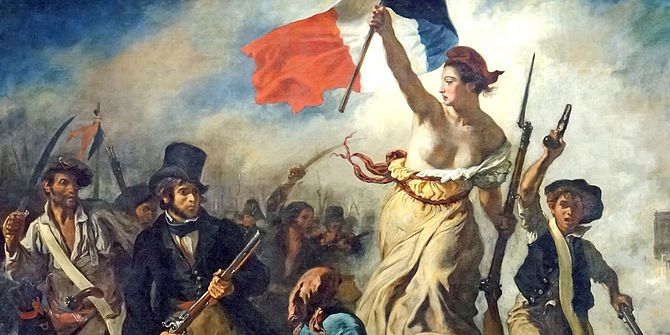Daniel Coyne brings together the contributions to the Populism and Religion series. He suggests that transcendental allusions are an inescapable part of politics and not simply a tactic deployed by demagogues. The defenders of liberal democracy must recognise this, and combine smart policy with a compelling vision that adequately addresses public concerns.

Populism seems to be everywhere, both the word and the many phenomena labelled as such. Setting religion aside for the moment, let’s consider what populism actually means and why it’s such a contested term.
One reason is the word itself. It conjures up a neutral, if not positive image. Populism isn’t a coherent set of political ideas in the same way that socialism, libertarianism and conservatism are. We all know the political vision of these ideas, and therefore we know what it is that the socialist, libertarian and conservative are talking about. Populism lacks that immediate coherence as it seems to vaguely mean “the popular will”. The populist, therefore, is one who supports “the popular will”.
How do populists discern a singular public will? In the opening article in our series on the dynamic between right-wing populism and religion in the West, Nadia Marzouki and Duncan McDonnell write that, for the populist, there is “the good people” and then there are ‘the corrupt elites and dangerous “others”’. With this, “the will of the people” takes a clearer form. It is rooted in identity, and goes beyond policy preferences and empirical calculations.
In truth, this “going beyond” is everywhere in politics. As Julian Göpffarth explains, it is ‘part and parcel of the principle of nation states and the very concept of democracy’. The socialist, libertarian and conservative each live their politics – they don’t just leave it at the door when they go home, or online when they log off twitter. They have not reached value-neutral conclusions simply based on the evidence, even if they are tempted to think they have.
Populism shares this transcendental characteristic, but what makes it different is that it doesn’t mature into a political programme to chart a new future for a country, or to conservatively manage a country. Instead it is a nationalist view that is backward-looking, in the most literal sense of the term. It seeks to restore what is lost. This political power of such nostalgia has been succinctly laid out for us by Sophia Gaston.
In the rhetoric of the day, this national and cultural loss is being blamed on liberal metropolitan elites and Muslims. Olivier Roy writes that ‘when the populists refer to Christianity it is as an identity, with the explicit goal of excluding Islam from Europe. Christianity is for them a cultural factor, not a value system.’ Ben Ryan calls this “Christianism”, a hollow political project which defines itself through the exclusion of Muslims. The values of Christianity are stripped out of Christianism and the theological meaning behind the crucifix and the nativity crib becomes irrelevant – they are simply cultural markers. This is what enables the populist hijacking of religion.
The “Christian” leaders of the populist movements can be figures like Donald Trump who, by any sensible definition, does not live according to the values of Christianity. Daniel DeHanas explains how Trump’s huge evangelical base has an apocalyptic vision which allows them to justify their support. They see Trump as a figure in eschatological history and a means to the end of a more Christian nation.
What do the Christian churches themselves make of this populist co-opting of the faith? In some places they may tolerate, or even welcome, the fusion of Christianity with a nationalist narrative. In her Poland case study, Helena Chmielewska-Szlajfer describes the new Licheń sanctuary where ‘oil paintings such as the Nativity Scene place religious and national heroes next to each other, including Polish kings, Pope John Paul II, and Lech Wałęsa, all waiting to see Baby Jesus in the stable’. This is how myths are born, or renewed, and it is powerful.
Bishop Nick Baines of the Church of England meanwhile offers a theologically-rooted Christian response: ‘Human beings are made in the image of God and must not be categorised, dehumanised or relativized by language that leads to violence or rejection’. He goes on to decry a wider political culture devoid of subtlety and nuance in which simplistic populist solutions to complex problems carry sway.
In truth there has been no one single Christian response to populism. In the final entry, Tobias Cremer’s research suggests that the role of institutional churches themselves is of crucial importance and that this varies according to national context. This is an important fact for us to bear in mind. The metaphor of a populist wave still seems to me to be appropriate, as this is a regional and indeed global trend. Yet each country has a different culture and faces different challenges.
This series on populism and religion has examined an under-explored aspect of politics. There are many reasons why populists have been successful, and I wouldn’t suggest that their use of Christian symbolism and rhetoric is the major story, but I do believe that this non-rational domain of public life – away from the statistics of job losses and GDP, and the empirical measurements of immigration and public expenditure – has profound salience.
Just as some of the most important things in a person’s life are non-rational – be it love, religion, an appreciation of art, the fortunes of their football team, spirituality – so too will this reality be an inescapable part of our political discourse. By co-opting religion and fusing it with a narrow nationalism that constructs monolithic enemies, populist movements successfully tap into this transcendental stream of life. Their vision is pure, unsullied by the boring verbosity of serious, achievable policies.
The response to such movements cannot be bland and devoid of feeling. People are disillusioned with “the establishment” for a reason, after all. Politicians must listen to the public, hear their concerns, and combine smarter policy with an equally compelling vision, liberal and inclusive, for what their countries are, and can be.
Note: This piece gives the views of the author, and not the position of the LSE Religion and Global Society blog, nor of the London School of Economics.






Byrnes T.A., Katzenstein P.J., 2006, Religion in an Expanding Europe, Cambridge University Press, ISBN 13 978-0-521-85926-4, etc., pp. 1-33 and 65-92: “… the southern and eastern enlargement of the European Union has brought Catholicism and the Orthodox Church into closer contact with the European project and incited lively debate about the likely impact of the EU on “traditional Christian values”” and “Most of the world today is certainly not secular. It’s very religious. … And so, in its own way, is Europe.” and about the European way with religion: a “strong survival of religion, most of it generally Christian in nature, despite the widespread alienation from organized churches. A shift in the institutional location of religion, then, rather than secularization, would be a more accurate description of the European situation.” … “To maintain a tradition under modern conditions demands a constant renewal of this tradition and creative responses to the changing challenges, and not just a traditionalist defense of the faith against the threats of liberalism, hedonism, and relativism.” and “… the Pope’s definition of European civilization is essentially Christian … “.